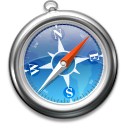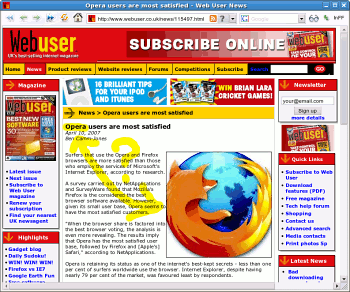 Following up on my previous post, Apple just dropped a bombshell: the Safari web browser is now available for Windows. I’ve posted some general reactions at K-Squared Ramblings as to how it will benefit web developers and users overall. The most obvious is that Windows-only web designers will no longer have an excuse for not testing in Safari, which might help break the two-browser mindset.
Following up on my previous post, Apple just dropped a bombshell: the Safari web browser is now available for Windows. I’ve posted some general reactions at K-Squared Ramblings as to how it will benefit web developers and users overall. The most obvious is that Windows-only web designers will no longer have an excuse for not testing in Safari, which might help break the two-browser mindset.
But what about Opera, specifically?
I remember when Apple first announced Safari for the Mac, Opera was very upset that Apple had decided to go their own way instead of licensing Opera as the new default browser. In retrospect, both sides were right: Apple was right to choose something that they could maintain themselves, without being dependent on an outside provider. (I guess they’d learned their lesson from Internet Explorer.) Opera was right that they lost a golden opportunity: as the default browser on MacOS, Safari has since become the most-used browser on that platform and the third-most-used browser overall, surpassing Opera’s marketshare.
So there’s certainly a risk that Safari on Windows could surpass Opera’s users. However, there is one significant difference: Safari is not the default browser on Windows. It’s hard to tell how much of Safari’s uptake on MacOS is due to it being the default, and how much is due to people actively liking it. Personally, I have Opera, Firefox, and a half-dozen other browsers on my PowerBook, but when I fire that box up, I generally use Safari.
If you look at the functionality available in a base install, from simplest to most complex, it probably starts with Safari, runs through Firefox and IE, then finishes with Opera. Firefox has a wide array of extensions available — in fact, it’s pretty much known for them. Safari isn’t nearly as extensible. You can’t install something that will add mouse gestures, for instance.
I suspect that, at least at first, the audience for Safari on Windows will consist mainly of the following groups:
- Web Developers
- Dual-platform users who are used to Safari on Mac
- People who just want a basic browser and don’t want bells and whistles, but don’t want IE for some reason
If anything, I think Firefox has more to worry about than Opera. For every Firefox user who tricks out his browser with every 1337 extension he can find, there are probably many who just wanted something more stable than IE, or faster than IE. There’s a vocal faction of Firefox users who are frustrated with its performance. I don’t know why they haven’t jumped ship to Opera, but depending on how much memory Safari uses when it gets out of beta, it might prove a threat on that front.
This post originally appeared on Confessions of a Web Developer, my blog at the My Opera community.


